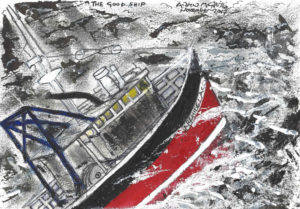Richard Murphy was not just a friend of Archipelago and of the Clutag Press. Through his first collection of poems Sailing to an Island (1963), he was a key figure in the history of the entire venture, a founding father in what we might call the archipelagic turn, taken so notably also by Norman Ackroyd and by Tim and Mairead Robinson. Andrew McNeillie’s An Aran Keening (2001), given him by Bernard and Heather O’Donoghue, was he wrote in June 2016 ‘the last prose work I have read from cover to cover with joy all the way’ and on its author’s birthday 12 August that year ‘What a good decision you made at the age of 22, it seems to me, to “chuck up everything and just clear off” – not to Woodstock but to Inishmore for a wild cold winter, and to have the discipline to keep notes from which later to produce a book composed like poetry with style, clarity and wit.’ To say he knew how to be kind is a massive understatement. He was a most delightful and generous-spirited man to have dealings with. In return I wrote the poem here. At his bidding it is to appear as the epigraph to a collection of essays about his work, Making Integral edited by Ben Keatinge and forthcoming – now sadly too late for its subject to hold it in his hand – from Cork University Press. (It recently appeared in Making Ends Meet, published by Guillemot Press.) The day of his death is surely a dark cold day, and hard indeed to think of him crossing the Sound for the last time to the High Island where there is absolutely no email or mobile phone connection, I’m told.
Richard Murphy
Between our roads, a handful of years,
and then the past all round these shores
haunted by the ghost of the Ave Maria
telling the epic of the Cleggan Disaster
holding today up to yesterday’s mirror –
the world kept afloat by running repairs.
The landlady of Oliver’s Seafood Bar
calls in mirth (from a tale or song of long ago?)
‘Your heart beats when you hear my name,’
she laughs and tells it him again, ‘Joe, Joe,
your heart beats when you hear my name.’
So Cleggan resounds, the day set fair
waiting for the ferry. And my head full
of memories of sailing to an island –
of corncrakes in the month of June
grinding out their tuneless tune:
such unlikely music. My heart unmanned
to hear it once more, to hear it still
on Inishbofin by Cromwell’s fort
and the blind tower, as the ferry departs
and leaves me caught in ’68 and ’69 again,
days on the cusp of violence as they were,
reminded of all those broken hearts
from ‘Droit de Seigneur’ to Aughrim –
holding yesterday up to today’s mirror
and reading in its guilt-edged frame
the old story of a poet’s prescience
who saw tomorrow the day before.
Small wonder then that I should say:
my heart beats when I hear his name.

